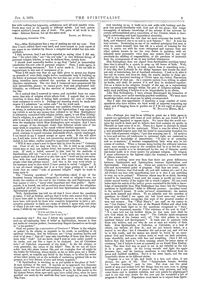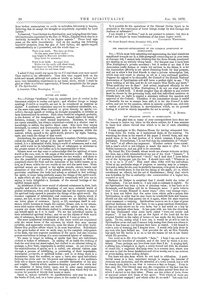 |
vol. title: Vol Four of The Theosophical Society of The Arya Samaj of Arya-wart vol. period: Sept 1878 – Sept 1879 pages in vol.: 350 |
< The Religious Aspects of Spiritualism (continued from page 8-120) >
war with nothing but hypocrisy, selfishness, and all such ignoble vices. Truth may vary in its aspects to different minds. Let each person respect another's honest idea of truth. The germ of all truth is the same: different flowers, but all the same seed.
Kensington, December 27th.
<Untitled> (Sir,—Miss Kislingbury has...)
Sir,—Miss Kislingbury has a way of making me rub my eyes. This time I have rubbed them very hard, and have turned to your report of my paper to see whether by chance a misprint had misled her into misquotation.
I find, however, that I am there reported as saying what I did say, that “the whole code,” not “the sole code” (a very different thing), of personal religion follows, or may be deduced from, certain facts.
I should most assuredly decline to say that “belief in immortality constitutes the sole code of personal religion.” That, I quite agree, is “an astonishing statement.” But I never made it. I am not able to approximate to any sort of acceptance of it.
What I did argue was that an age little given to accept any dogma on grounds of mere faith, might derive inestimable help in building up the fabric of personal religion from the fact that one or two of the underlying doctrines have received the sanction of demonstration from objective experiment. The two that I instanced were perpetuated life (not immortality, please; we cannot prove that) and perpetuated individuality, as evidenced by the survival of interests, affections, and the like.
Be it noticed that I reserved in terms, and excluded from my argument, that side of religion which affects God. I argued that we were receiving in these days of fading faith precisely the sort of evidence most necessary to revive it. Perhaps my meaning would be made still clearer if I substitute “an entire code” for the word used.
But whether or not my argument was justified, whether I was right or wrong in endeavouring to show that the Spiritualism I was expounding (which is not by any means that referred to by Miss Kislingbury) is intimately connected with religion (which, again, is not Miss Kisling-bury’s religion), is a small matter. I hold to my view, but I am entirely able to see that it will not commend itself to one who views Spiritualism from the standpoint which Miss Kislingbury now occupies. And I have seen enough of the divergent views that different minds take of the same truth to acquiesce in the result without further argument.
But the letter in which Miss Kislingbury propounds her views with so much courtesy to myself contains statements which, openly challenged, I am bound to say I cannot accept or agree with. If she will allow me, I will take leave of her, and concerning myself only with the views stated in her letter, confine myself to impersonal criticism.
“Will it save a man’s soul to know that he lives for ever?” Certainly not. First of all, he does not know it. He is told so on authority which may or may not induce belief, but cannot give knowledge. And next. If such a belief, assured to him best by the methods of Spiritualism, will not “save his soul,” it will, at any rate, be the most potent method that I know of to stir him up to “work out his own salvation with fear and trembling,” as one who knows better than most people what that phrase means. And this is the very work which in the sentence next to that which I have quoted is called “religion.” It is not all-round religion, but it is a very large portion of it; and I think that an entire “code of personal religion” might be made to hang upon it.
The “burning questions” of Spiritualism—shall I say of the broadest human 'interests, irrespective of creed or religion?—are, no doubt, the relation of the soul to the Creator, sin, and forgiveness, and that quaint et cetera, “many other important and vital points.” Spiritualism, it is hinted, can tell us nothing about these; and the allegation is justified (if at all) by the patent fact that Spiritualism does not make Spiritualists perfect.
Well, Spiritualism has told me all that I know about the questions at issue. I will go further, and say that it is the only source from which I have been able to derive any knowledge whatever on the subject. I have been told much by those who conceive themselves to have a prescriptive authority to teach me—some of which I agree with, and some of which I do not—and, exercising the inalienable right of private judgment, I abide by my selection:
“If it be not true to me, |
to somebody else? Nor can I follow the argument which condemns such an all-embracing form of belief as Spiritualism, because it does not make its votaries perfect; because they disport themselves as though in “a tea-garden.”
Shall we pursue the argumentum ad hominem? Where is the religion so potent in its effects, so majestic in its creed, so purifying in its spiritual influence, that its followers are “living sermons known and read of all men;” that all “may take knowledge of them that they have been with” God? Let me know, that I may at once enlist myself in its ranks, and cry like a leper to be cleansed. Are all Christians holly? all Catholics ornaments of the faith? Is the life always, or even generally, the reflex of the belief? Nay, do we not all know noble men who adorn human life, and set examples that all might be the better for following, whose minds, as far as faith goes, are a blank; whose spirit, as respects any belief in the future, or in what the writer of this letter points out as the methods of sustaining spiritual life in the present, is a very Sahara of arid and dreary negation?
“If Spiritualism is teaching us to put spirits in the place of God.” It does nothing of the sort. It teaches us to approach the Supreme through those who are His intermediary’ agencies; to aspire higher and higher, and to use their aid and guidance, if so be, by His mercy in the far-distant future, when ages upon ages have rolled away, when we have purified our souls by the methods they have taught us, we may behold His Face.
And teaching us so, it leads us to cast aside with loathing and disgust that pseudo-familiarity with God and all his plans; that vulgar assumption of intimate knowledge of the scheme of the universe by certain self-constituted privy councillors of the Creator, which is theology’s culminating and most hypocritical absurdity.
“If it is to abrogate the rule that we must overcome the world, the flesh, and whatever else to us and in us is Satanic.” No! It does the very reverse. Inculcating as one of its cardinal principles that man is what he makes himself, that this life is a school of training for the next, it points out with far more stringency and cogency than any other system known to me the very duties in question, with an infinitely more persuasive voice than any system that in any way sanctions the shifting of responsibility, or the purchase of immunity from the consequences of sin by any method whatsoever.
Miss Kislingbury does not expect from Spiritualism anything better than that it should be a crutch to prop up old forms of faith. Well, they need it badly. But I, at least, expect from it something more; if only this, that it should he the sledge hammer that breaks the skull not only of materialism, but of fossilised orthodoxy. I look to it, after it has run its course and done its duty, for results similar to those produced by the heretical teaching of Christ upon the Judaic Pharisaism and infidelity of that age. As a concrete system I am willing to admit its faults, and shall be content if it and they be abolished together. But as a factor in the religious thought of the age, as a regenerating force operating most strongly within the pale of religious systems that sadly need purifying, I believe it to be imperishable in its effects.
Like Miss Kislingbury, I have always discouraged the formation of private circles, save under carefully guarded conditions. We want more knowledge before such steps can be safely recommended.
May I take this opportunity of thanking a large number of correspondents who have written me kind words of approval respecting my paper, and of begging them to pardon me if I do not reply to them privately?
The Religious Aspects of Spiritualism
Sir,—I am glad that so many of your correspondents have done me the honour to notice my letter on the above subject, for I was anxious to learn how others viewed that which is to me of such absorbing interest.
I must apologise to Mr. Stainton-Moses for having misquoted him. I wrote down his words, as I understood them, at the meeting. On searching for them in the report of his paper I missed them, and supposed them to be in that portion of it which remains, I hope, to be published. Nevertheless, I do not find that the substitution of “whole” for “sole” at all affects my argument. Whether certain views constitute a man’s whole or sole religion is much the same in effect. But I dislike inaccuracy, and am glad to be corrected.
My friend Mr. Fitz-Gerald, whose words are always welcome as they are wise, has a little misunderstood my use of the word “Satanic.” I tried to avoid the old-fashioned “devil,” but I find that I have fallen out of the frying-pan into the fire. I should have said, “Whatever in us or to us is of evil.” This must often differ with the individual. What at my particular stage of progress or training may be a temptation and a cause for sin, may be perfectly harmless, even good, in another. In the old-world story, it was not the eating of the apple, per se, which constituted an offence, but the act of disobedience; doing that which was forbidden by One in authority—the contravention of a higher law, accepted as such.
Madame de Steiger is surprised that I should doubt the value of Spiritualism. I do not doubt it; I only wish to estimate it rightly. To me Spiritualism has been a boon of priceless value; it has been so to thousands, and doubtless will be to thousands more. I quite believe that “God reveals Himself in many ways,” often very strange ways; but it does not follow that the same voice which calls a person into Spiritualism, in order that he may learn its wonderful facts and lessons, should not also call that person out of it again, when his state requires other treatment or training. Spiritualism came to me in a time of great spiritual darkness, and it has been to me a great spiritual illuminator. It has not only shown me its own facts, but it has acted as a key by which to interpret other facts. It has gone with me into the churches, and has illuminated what some have called “worn-out creeds and. dogmas.” It has done for me as the Spirit of the Lord did for the prophet Ezekiel in the valley of bones—it has made the dry bones live again. To me, seeing what I now see, it would be an evil to rest in Spiritualism as an end, and I cannot help seeing that there are others to whom it has been an evil because they have so rested. I felt bound to raise a note of warning, but I despise none. I would only help those in my turn who have helped me. God provides for all, as Mrs. Nicholls has said, but He leaves it to us to use the means (or not to use them) which He provides.
One word as to Mr. Fitz-Gerald’s “facts.” I hope I am not slow to appreciate the beauties of creation, and of the laws by which it is sustained. None, perhaps, can love them more than I do. A singing bird, a sitting hen, a hedgerow in April, a newly-turned sod with its wonders of insect life, a neglected dirt-heap even, in a country lane, where you are sure to find the finest dandelion sand silver-weeds, are to me sources of never-failing, never-ending delight.
But there are also facts which do not tend to edification. A pestilential sewer is a fact, important enough to engage the interest of chemists and deodorists, and the attention of a town council, but it will be clearly their duty to see that it remains a fact no longer. Even in that case, Mr. Fitz-Gerald may say, the recognition of the fact was the thing. I quite agree. But we are here on other ground from that on which I started in my first letter. There are two orders of facts, those of material nature and those of the spirit. With which of these are we Spiritualists engaged? and which order do we seek? Let each find <... continues on page 8-126 >
Editor's notes
Sources
-
London Spiritualist, No. 332, January 3, 1879, p. 9
-
London Spiritualist, No. 333, January 10, 1879, pp. 20-1


